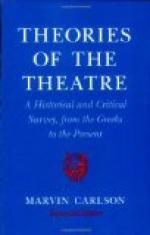But not only novel and startling stage effects should be avoided in the main dramatic moments of a play. Excessive magnificence and elaborateness of setting are just as distracting to the attention as the shock of a new and strange device. When The Merchant of Venice was revived at Daly’s Theatre some years ago, a scenic set of unusual beauty was used for the final act. The gardens of Portia’s palace were shadowy with trees and dreamy with the dark of evening. Slowly in the distance a round and yellow moon rose rolling, its beams rippling over the moving waters of a lake. There was a murmur of approbation in the audience; and that murmur was just loud enough to deaden the lyric beauty of the lines in which Lorenzo and Jessica gave expression to the spirit of the night. The audience could not look and listen at the self-same moment; and Shakespeare was sacrificed for a lime-light. A wise stage-manager, when he uses a set as magnificent, for example, as the memorable garden scene in Miss Viola Allen’s production of Twelfth Night, will raise his curtain on an empty stage, to let the audience enjoy and even applaud the scenery before the actors enter. Then, when the lines are spoken, the spectators are ready and willing to lend them their ears.
This point suggests a discussion of the advisability of producing Shakespeare without scenery, in the very interesting manner that has been employed in recent seasons by Mr. Ben Greet’s company of players. Leaving aside the argument that with a sceneless stage it is possible to perform all the incidents of the play in their original order, and thus give the story a greater narrative continuity, it may also be maintained that with a bare stage there are far fewer chances of dispersing the attention of the audience by attracting it to insignificant details of setting. Certainly, the last act of the Merchant would be better without the mechanical moonrise than with it. But, unfortunately, the same argument for economy of attention works also in the contrary direction. We have been so long used to scenery in our theatres that a sceneless production requires a new adjustment of our minds to accept the unwonted convention; and it may readily be asserted that this mental adjustment disperses more attention than would be scattered by elaborate stage effects. At Mr. Greet’s first production of Twelfth Night in New York without change of scene, many people in the audience could be heard whispering their opinions of the experiment,—a fact which shows that their attention was not fixed entirely upon the play itself. On the whole, it would probably be wisest to produce Shakespeare with very simple scenery, in order, on the one hand, not to dim the imagination of the spectators by elaborate magnificence of setting, and, on the other, not to distract their minds by the unaccustomed conventions of a sceneless stage.




